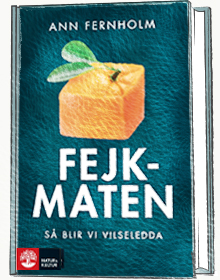Tittar just nu på presentationen av de nya näringsrekommendationerna, NNR 5, som pågår i Danmark. Du kan titta på den via denna länk: new.livestream.com/teletechdk/nordisk
Ursula Schwab, en av forskarna som har gått igenom vilka fetter vi ska äta, säger plötsligt:
”Low-fat diets are not good for you”.
Hon säger att när halterna fett i dieten börjar krypa under 25 procent, ökar nivåerna av triglycerider i blodet, det goda kolesterolet går ner och personer börjar att utveckla glukosintolerans, förstadiet till diabetes.
Bara så där, med en axelryckning, avfärdar hon alla lågfettrekommendationer som vi har fått sedan 1970-talet. Ett tag skulle vi absolut inte få mer än 30 procent av våra kalorier från fett. Ju mindre fett desto bättre. Det har lett till att vi har fått metabolt syndrom: höga triglycerider, låga nivåer av gott kolesterol och glukosintolerans. Det söta blodet har i sin tur lett till följdsjukdomar: diabetes, hjärt-kärlsjukdom och cancer.
Ursula Schwab kommenterar inte med ett enda ord att rådet som vi fick tidigare har varit dåligt för oss. Jag kan tycka att det är hyfsat magstarkt.
Vill du läsa fler liknande inlägg? Titta i kategorin Övrigt, Okategoriserade. Stötta mitt arbete via Patreon.







Kareng ∙ 3 oktober, 2013 kl. 12:56
Imorse när svt morgon intervjuade en kvinna via telefon från SLV var det enda som kom fram, och som hon sa flera gånger under den korta intervjun, att det är farligt med fett från grädde och bacon, och att fettet ska komma från oliv- och fröoljor.
Ingenstans förklarar man hur det kan vara okej att äta mättat fett för feta (enligt SBU-rapporten), men att det är farligt för den andel av den vuxna befolkningen som är normalviktig (51%, enligt Folkhälsoinstitutet).
Har Livsmedelsverket en enda nutida korrekt utförd studie som pekar mot att mättat fett är farligt för någon?
≪ | ≫ |
Stine ∙ 3 oktober, 2013 kl. 13:00
Bravo!
≪ | ≫ |
oldman94 ∙ 3 oktober, 2013 kl. 14:22
MEN detta borde läkarna vetat väldigt länge……det finns ju förklarat i deras böcker…inget socker etc. inget behov av insulin o vice versa……men de som säljer insulin, kolhydratrika förädlade livsmedel etc. vill väl inte att vi skall äta mer animalt…..men troligtvis blir maten dyrare med den numer ”riktiga” kosten…..
≪ | ≫ |
AnnikaJ ∙ 3 oktober, 2013 kl. 14:23
Sedan jag började äta en liberal LCHF sjönk mina triglycerider till 0,65 ! Det goda kosterolet ligger högt. Tydligen lever experterna och vi vanliga människor i skilda världar.
Numera äter jag mycket fett av olika slag, och mycket grönsaker. Mitt långtidssocker ligger på 36.
Jag säjer med ett uttryck jag lärde mej när jag bodde i Bohuslän när man tyckte att något var väldigt tröttsamt:
”Jag blir så klen”.!
Hellre frisk på en ”felaktig” diet än sjuk på en ”rätt”!
≪ | ≫ |
PerNissila ∙ 3 oktober, 2013 kl. 16:55
Elisabeth Wirfält rekommenderade även fröoljor över smör och andra fetter från djur… Är det verkligen bättre med härsket processat onaturligt fett?
≪ | ≫ |
Pennylope ∙ 3 oktober, 2013 kl. 19:24
Är det inte just det hon gör, säger att de tidigare råden varit dåliga?
≪ | ≫ |
Eva G ∙ 4 oktober, 2013 kl. 07:46
Ursula Schwab är Finlands motsvarighet till Maj-Lis Hellenius. Att hon uttalade dessa ord kan anses som mycket bara det.
≪ | ≫ |
AnnFernholm ∙ 4 oktober, 2013 kl. 12:11
Aha. Intressant.
≪ | ≫ |
Thomas Tombola Jansson ∙ 4 oktober, 2013 kl. 08:01
Nu är det ju inte säkert att det var Ursula Schwab som startade de tokiga kostråden utan snarare är en av de personer som gör sitt för att återställa saker & ting – skjut inte budbäraren,,,,
Enklast vore det väl att lägga ned Livsmedelsverket helt och låta dess märkliga och oftast okunniga personal söka sig nya jobb – sedan kunde man ju starta upp verksamheten på nytt,,,
≪ | ≫ |
AnnFernholm ∙ 4 oktober, 2013 kl. 12:11
Även om det inte var hon, har hon ett ansvar att kommentera en sådan kovändning.
≪ | ≫ |
AnnFernholm ∙ 4 oktober, 2013 kl. 12:11
På ett något otydligt vis, kan jag tycka.
≪ | ≫ |
Richard Arppe ∙ 4 oktober, 2013 kl. 19:27
Ann
Ornish’s patienter (Ornish et al 1991) använde kosthållning som innehöl <10% fett. Vegetarisk, väldigt low-fat. HDL-C went down, and triglycerides increased moderately, this occurred together with dramatic shrinkage of atheromaplaques in the arteries as verified by angiogram and PET scans. The LDL cholesterol went down 40% in 12-weeks which is comparable to aggressive Atorvastatin therapy. Vad Schwabb sa är complete utter nonsense. Man måste dock point att triglycerides minskade också när surveyn pågick längre.
http://www.amazon.com/review/R2DVT1G094ORYQ/ref=cm_cr_dp_title?ie=UTF8&ASIN=0804110387&nodeID=283155&store=books
När vi talar om medelhavkost är bra att komma ihåg att resultatarna demonstrated by Ornish are from another planet. Det finns inte det enda medelhavskoststudien i världen där patienter iintervention arm skulle INTE vara fullt pumped med statiner, diuretics, blodtrycsmedicin, etc (Lyon, Predimed, Shai et al, etc.)
≪ | ≫ |
Richard Arppe ∙ 5 oktober, 2013 kl. 05:30
An elevation of triglycerides reflecting decreased triglyceride clearance may not be pathogenic — relevance to high-carbohydrate diets.
”There is growing reason to suspect that the increased coronary risk associated with elevated triglycerides in Western epidemiology reflects the fact that high triglycerides are a marker for insulin resistance syndrome, rather than any inherent pathogenic role of triglycerides per se. Thus, endothelial dysfunction is seen only in those hypertriglyceridemic subjects who are insulin resistant, and is absent in patients whose markedly elevated triglycerides reflect genetically defective lipoprotein lipase activity. Triglyceride levels are relatively high in certain Third World societies which are virtually immune to coronary disease so long as they persist in their traditional very-low-fat diets; in Ornish’s celebrated study, a moderate rise in triglycerides coincided with a marked reduction in coronary events. Although the particle size of both LDL and HDL tends to decrease when triglyceride levels are high, it is questionable whether this effect has a major pathogenic impact. The one clear drawback of high-carbohydrate diets is a decrease in HDL particle number, resulting from decreased hepatic production of apoA-I; this effect is seen whether or not triglycerides increase. The very favorable effects of very-low-fat, whole food, quasi-vegan diets on LDL cholesterol, insulin sensitivity, and body weight appear to more than compensate for this decrease in HDL; it is notable that HDL levels tend to be quite low in Third World cultures at minimal risk for coronary disease. On the other hand, this decrease in HDL may be of more significance in the context of omnivore diets only moderately low in fat, as suggested by the fact that diets higher in unsaturated fats emerge as more protective in Western prospective epidemiology. The tendency of high-carbohydrate diets to boost triglycerides can be minimized by exercise training, supplemental fish oil, an emphasis on fiber-rich, low-glycemic-index whole foods, and the ”spontaneous” weight loss often seen with ad libitum consumption of such diets — measures which are highly recommendable whether or not triglycerides are a concern”.
http://www.ncbi.nlm.nih.gov/pubmed/15504577
≪ | ≫ |
AnnFernholm ∙ 6 oktober, 2013 kl. 16:15
Till och med LIvsmedelsverkets experter underkänner en sådan diet eftersom det leder till näringsbrist. MÅnga vitaminer vi behöver är lösta i fett.
≪ | ≫ |
Richard Arppe ∙ 14 oktober, 2013 kl. 16:45
Jag trodde att du skulle vara mera mottaglig for a diet that has been shown to reduce coronary heart disease without drugs in patients diagnosed with severe CHD.
≪ | ≫ |
AnnFernholm ∙ 15 oktober, 2013 kl. 18:41
LDL är absolut inblandat i åderförkalkning. NÄr du äter mycket socker och snabba kolhydrater minskar partiklarna i storlek och fastnar lättare i blodkärlan. ATt ha genetiskt höga nivåer är också kopplat till hjärtinfarkt. Statiner hjälper. Men ingen har någonsin visat att mindre mättat fett i dieten skulle hjälpa. Det är en helt annan sak. Mättat fett påverkr framförallt HDL.
≪ | ≫ |
Richard Arppe ∙ 16 oktober, 2013 kl. 07:09
Ok,
så enligt dig mättade fetter ökar LDL kolesterol på något unique mechanism som är icke skadligt alls? Revolutionary! Jag påpekar dig att när vi talar om gener, talar vi om stora antalet om olika gener som har alla olika mechanism att minska LDL, men som alla minskar risken för CHD med likadan accuracy. Det finns ingen skillnad vad är det för mechanism som ökar LDL, de alla lika skadliga. Tvärtemot det finns inte den enda randomiserade studien i världen som skulle visat att modification av HDL kolesterol skulle vara nyttigt. Förstår inte vad du menar med din point att mättade fetter i dieten har ingen effekt? Är det så att enligt dina standards ingen har heller visat att smoking cessation is beneficial? Tycker du att det är helt ok att expose to asbestos, vi har ju ingen RCT skulle har visat någon skada? Du låter precis som de som förespakar intelligent design på nätet.
Socker har har nästan ingen effekt på LDL. Man måste dricka väldigt mycket coca-cola per dag för att det skulle blir någon effekt.
1) There are virtually thousands of animal studies showing that saturated fat and dietary cholesterol accelerates atherosclerosis across virtually every type of vertebrate, and that they are the sine qua nons for the dietary modification of experimental atherosclerosis. This includes mammalian, avian and fish species- herbivores, omnivores and carnivores, and over one dozen different species of nonhuman primates. Again this cannot be attributed to the way that the animal was raised as when taking into consideration the amount of antioxidants and carotenoids as well as the lack of cholesterol, tropical plant fats high in lauric, myristic and palmitic acids will also accelerate atherosclerosis in animals to a similar degree as saturated animal fats.
2) Hundreds of rigorously controlled metabolic ward studies establishing that dietary cholesterol and saturated fat elevate LDL and total cholesterol. The cholesterol raising effects of saturated fat is not the result of how the animal was raised as tropical plant fats high in lauric, myristic and palmitic acids will also raise total and LDL cholesterol.
3) Meta-analysis of 108 randomized controlled trials with 300,000 subjects and with a mean follow-up of only three years establishing that lowering LDL significantly reduces both coronary heart disease and all-cause mortality independent of changes to HDL cholesterol and triglycerides, and non-lipid effects of specific interventions.
4) A meta-analysis of mendelian randomization studies with over 312,000 individuals demonstrated that inheriting any of nine studied genetic variants that modify lifelong LDL cholesterol concentrations, but not any other known risk factors predicted a 55% lower risk of coronary heart disease for each mmol/l (38.7 mg/dl) lower LDL cholesterol. This represents a three-fold greater reduction in coronary heart disease per lower unit of LDL cholesterol than the statins trials which lasted only 5 years and the average participant age was 63. The p-value for this finding was 0.000000000000000000843. This is also expected to also translate into a 3 fold lower risk of all-cause mortality. The authors concluded:
“We found no evidence of any heterogeneity of effect on the risk of CHD per unit lower LDL-C among any of the polymorphisms included in our study. This lack of heterogeneity of effect strongly suggests that the results of our study are unlikely to be significantly confounded by pleiotropy or linkage disequilibrium because it is unlikely that each of the included polymorphisms are acting through similar pleiotropic effects or have similar linkage disequilibrium patterns… This finding suggests that the effect of long-term exposure to lower LDL-C on the risk of CHD appears to be independent of the mechanism by which LDL-C is lowered. Therefore, the method of lowering LDL-C is likely to be less important than the magnitude and timing of LDL-C reduction. As a result, diet and exercise are probably as effective at reducing the risk of CHD as are statins or other treatments that lower LDL-C when started early in life (and when measured per unit lower LDL-C).”
≪ | ≫ |
AnnFernholm ∙ 17 oktober, 2013 kl. 09:15
Nä, det är socker och snabba kolhydrater som gör att de blir mindre till storleken och oxiderar lättare. Du får läsa på lite om leverns fettmetabolism.
≪ | ≫ |
Richard Arppe ∙ 18 oktober, 2013 kl. 07:04
1) In the Women’s Health Initiative the control group who were advised to lower fat intake significantly increased the intake of sugar and showed trends towards lower body weight and waist circumference. If anything there was a slight trend towards a lower risk of diabetes in the control group.
http://ajcn.nutrition.org/content/91/4/860.full
2) Kempner’s rice-fruit diet which was based on white-rice, fruit, fruit juice and sugar resulted in weight loss in most patients. The symptoms of diabetes was also relieved among the patients in the program.
DIETARY TREATMENT OF HYPERTENSION. CLINICAL AND METABOLIC STUDIES OF PATIENTS ON THE RICE-FRUIT DIET
http://www.ncbi.nlm.nih.gov/pmc/articles/PMC436162/
3) In an experiment Armstrong and colleagues induced severe atherosclerosis in rhesus monkeys by feeding a diet with 40% of calories from egg yolks for 17 months. The egg yolks were then removed from the monkeys diet and replaced with a cholesterol-free diet with either 40% of calories from corn oil or low-fat chow with 77% calories from sugar for three years, resulting in a reduction of serum cholesterol to <140 mg/dl and a marked regression of atherosclerosis.
http://circres.ahajournals.org/content/27/1/59.full.pdf+html
4) Sugar intake was observed to be modestly high, a trait comparable to that of the populations in Colombia, Cuba and Venezuela who have traditionally had among the highest rates of per capita sugar consumption in the world and low rates of coronary heart disease mortality
Sucrose in the Diet and Coronary Heart Disease Mortality (Ancel Keys 1971)
http://legacy.library.ucsf.edu/tid/pdg66b00/pdf
≪ | ≫ |